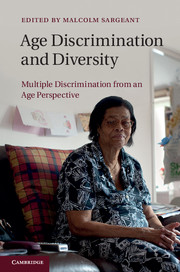Book contents
- Frontmatter
- Contents
- Figures
- Tables
- Contributors
- 1 Ageism and age discrimination
- 2 Multiple discrimination
- 3 Older women, work and the impact of discrimination
- 4 Still disadvantaged? Women in modern pension systems
- 5 Ageing and social class: towards a dynamic approach to class inequalities in old age
- 6 Age, sexual orientation and gender identity
- 7 Age and ethnicity
- 8 Disability and age discrimination
- 9 New approaches for understanding inequalities in service use among older people
- Index
- References
3 - Older women, work and the impact of discrimination
Published online by Cambridge University Press: 05 August 2011
- Frontmatter
- Contents
- Figures
- Tables
- Contributors
- 1 Ageism and age discrimination
- 2 Multiple discrimination
- 3 Older women, work and the impact of discrimination
- 4 Still disadvantaged? Women in modern pension systems
- 5 Ageing and social class: towards a dynamic approach to class inequalities in old age
- 6 Age, sexual orientation and gender identity
- 7 Age and ethnicity
- 8 Disability and age discrimination
- 9 New approaches for understanding inequalities in service use among older people
- Index
- References
Summary
Introduction
The aim of this chapter is to shed some light on the impact discrimination has on older women (50 +) and to investigate how their under-representation in the workforce may be partly attributed to a combination of past and present age (and gender) discrimination. It is suggested that a tension exists for older women in attempting to access employment as being at odds with their experiences of gendered ageism, the gendered assumptions of both the family and wider society and their sufferance of gendered disadvantage and discrimination. Each of these aspects has created barriers to women’s participation.
- Type
- Chapter
- Information
- Age Discrimination and DiversityMultiple Discrimination from an Age Perspective, pp. 41 - 64Publisher: Cambridge University PressPrint publication year: 2011
References
- 2
- Cited by



